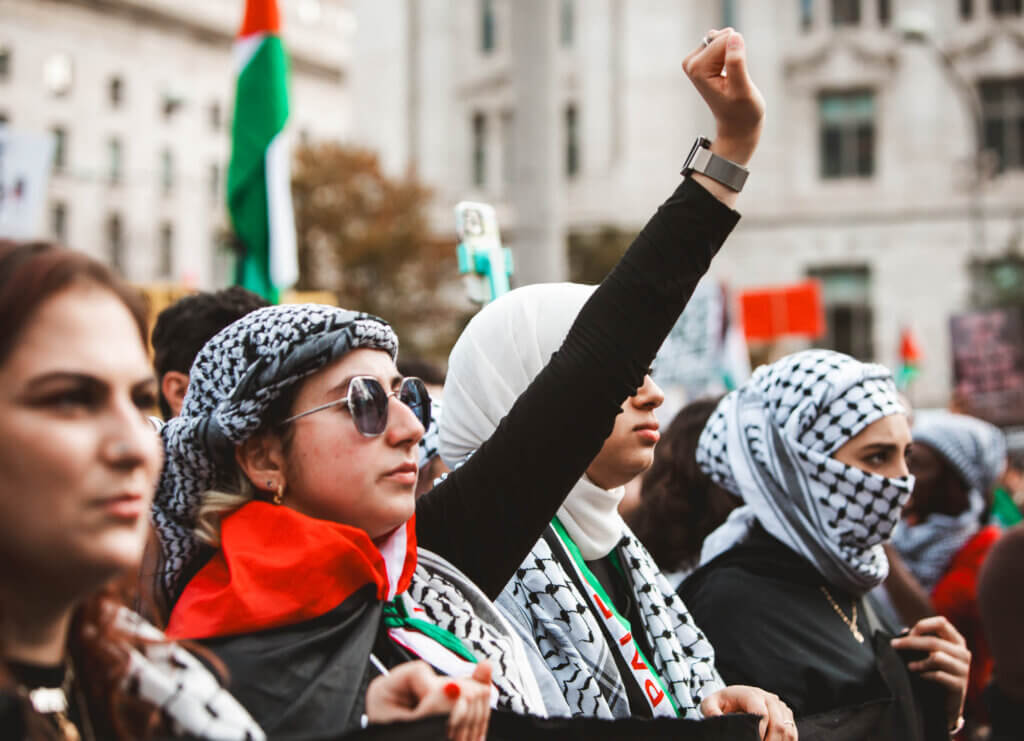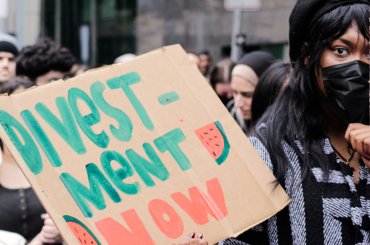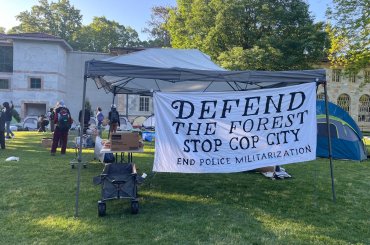Editor’s Note: The following open letter was initiated by the recently formed “Inter-University Coalition on Palestine,” which currently has signatories from over 200 universities worldwide. To add your university and join the coalition for future organizing, sign here.
We write as workers and students of the university to reiterate our conviction that the struggle for Palestinian liberation is our collective cause. The occupation of Palestine is a frontline in the endurance of colonialism and its myriad sites: seas, borders, camps, and settlements. The occupation of Palestine has embodied global anticolonial solidarity since at least the early twentieth century. Such solidarity and mobilization further deepened with the outbreak of anticolonial struggles in the mid-twentieth century and continued to strengthen since the 1970s. Today, we continue in their footsteps.
Calls for Palestinian liberation grow louder in the face of air strikes and televised mass murder. But the occupation of Palestine is no punctuated experience; it structures everyday life. It shows us that the Nakba of 1948 is a constantly unfolding event. It is an ongoing system of apartheid that undergirds Israel’s existence as an ethno-national state. This colonial history is not a primordial rivalry between Arabs and Jews, nor is it a conflict between two equal powers. Settler colonialism in Palestine is a century-long process, as well as an instrument of British and later American imperialism.
Israel’s siege of Gaza only reasserts the country’s colonial power over Palestine. The siege is a tightening chokehold on the Palestinian struggle against years of blockade, fragmentation, controlled resources, restricted mobility, and, increasingly, starvation.
We refuse to participate in a discursive war that renders some lives more grieveable than others. Our stratified vocabulary of mourning and victimhood forecloses the critical recognition that lying beyond the border walls and fences, there is a shared humanity. Wrapped in the rhetoric of mainstream media and politicians is the claim that people who risk everything to overthrow the chains of racialized oppression do not deserve to live. The echoes of the decolonizing war in Algeria, the anti-apartheid movement in South Africa, and the ongoing struggle for Black liberation ring loudly. The same racialized logic that rendered these movements the work of primitive, violent savages now demands we condemn Palestinians as uncivilized and barbaric. We refuse the status quo that these constructions uphold.
Pro-Palestinian speech is met with McCarthyite backlash on university campuses. Institutions of higher education have abdicated their responsibility to protect the lives and well-being of Arab, Black, Brown, Indigenous, and Muslim students. University administrations’ calls for “diversity,” “equity,” and “inclusion” conspicuously disregard the long-suppressed Palestinian claim to life. Our institutions produce vacuous statements while far-right organizations – bankrolled by donors with endowed university centers – harass, threaten, and actively harm marginalized students. Death threats and doxxing against students and faculty who speak out against the occupation of Palestine and systemic violence have become the norm.
Across the Global North, the classroom is compromised by capitalist capture, which constrains the liberatory potential of our thought. Behind the veneer of neutrality lies the dollar. Our university endowments – growing in value thanks to investments in a racialized prison industrial complex that stretches from Israel to the United States – are bloated by the eager affirmation of white supremacy. The university derives dividends from bloodshed via weapons and oil investments that produce the Middle East as a fractured geography of war. Today, the university is one of capitalism’s most productive agents. Our universities are not financially bankrupt; they are morally so.
The apartheid wall, the border fence, the prison bar, and the police cordon are conjoined sites of struggle fragmented in appearance only. Liberalism’s limited vocabulary has thinned our perceptions of the possible, suturing the future to the ruins of procedural democracy. We recognize these systems at work in our own lives, in our poisoned politics, and in the fragmented solidarity that renders us all complicit today.
Neutrality cannot be the condition for participation in the university. Dissent is pedagogy. Knowledge is politics. In the interstices of the university, we insist on different relations of learning and struggle that remember and reenact the classroom as a space for protest.
Palestinian liberation is the grammar of our collective freedom. Palestinians offer us a language that can force the locks and break the chains of domination that structure our world. To accept the existence of an ethnostate predicated on dispossession and genocide would be to foreclose the very possibility of justice.
Demands within a system where liberation is neither a category of thought nor action cannot meet our moment. Palestinian liberation is a practice of refusal. We cannot seek justice from a system committed to the permanent deferral of redistribution. We cannot imagine yielding to a status quo wherein condemning genocide is relegated to political positioning. What is needed now goes beyond all previous policy prescriptions. Talks of ceasefire and humanitarian aid, peace processes, and multi-national dialogues have only resulted in the continual theft of Palestinian land.
We take our cues and lead from Palestinian voices within the university, beginning with the echoes of Birzeit University’s Union of Professors and Employees:
We in occupied Palestine — and all Palestinians — have no illusions in the poetic dreams of the triumph of the pen over the sword because the sword has cut too deeply into our flesh at the hands of an enemy who has been granted by the hypocritical international community and the destiny of imperial history to claim a monopoly on both the sword (that which acts to kill) and the pen (that which narrates the acts of killing). As intellectuals and academics working in occupied Palestine, we have to use our words, however futile they may feel in such critical times. We also have faith in the bold souls of our people, our resistance and the triumph of freedom, and in our inalienable rights. We recognize and proclaim that at this critical and urgent historical juncture, we shall overcome – justice shall overcome. We are not your passive victims; we have been murdered, maimed, and displaced by a setter state driven by an ideology of insane hatred and bloody violence, but we will not be silenced. Our resistance shows us the path forward, and we remain steadfast, and we shall triumph.
We join our colleagues in their resistance. We recognize that decolonization is a material practice. We call for the land back. We are mobilizing a coalition of students and workers at institutions of higher learning who refuse to accept the rules of the colonial university. We demand a Free Palestine. This is the horizon of our collective freedom.
Our call is open to all students and workers in higher institutions across the globe to sign. If you support the letter and would like to add your institution to the above list, please fill out the details here. Your personal information will not be displayed or shared, and you can sign the letter anonymously.
Signed by students and workers at:
- Alexandria University, Egypt
- Aligarh Muslim University, India
- Aljamea-tus-Saifiyah, Pakistan
- Ambedkar University Delhi, India
- The American University in Cairo, Egypt
- American University of Beirut, Lebanon
- The Autonomous University of Barcelona, Spain
- Azim Premji University, India
- Bard College, USA
- Baruch College, USA
- Berlin University of the Arts, Germany
- Birla Institute of Technology and Science, Pilani – Hyderabad Campus, India
- Birmingham City University, England
- Boğaziçi University, Turkey
- Boston University, USA
- Brac University, Bangladesh
- Brandeis University, USA
- Brigham Young University, USA
- Brooklyn College, USA
- Brown University, USA
- Butler University, USA
- Cà Foscari University of Venice, Italy
- California Institute of the Arts, USA
- Carnegie Mellon University, USA
- Central European University, Austria
- Christ University, India
- City University New York, USA
- City, University of London, England
- Christ University, India
- The Claremont Colleges, USA
- Clark University, USA
- College of Wooster, USA
- Columbia University, USA
- Concordia University, USA
- Dartmouth College, USA
- Delft University of Technology, Netherlands
- De Montfort University, England
- DePaul University, USA
- Drexel University, USA
- Duke University, USA
- Elmhurst University, USA
- Emory University, USA
- Erasmus University Rotterdam, Netherlands
- European University Institute, Italy
- ETH Zurich, Switzerland
- Federal University of Rio de Janeiro, Brazil
- Fielding Graduate University, USA
- Film and Television Institute of India, India
- Forum Transregionale Studien, Germany
- Fulbright University Vietnam, Vietnam
- Georg August University of Göttingen, Germany
- Georgia Institute of Technology, USA
- George Washington University, USA
- Guilford College, USA
- Hamad Bin Khalifa University, Qatar
- Harran University, Turkey
- Harvard University, USA
- Hertie School, Germany
- Hitotsubashi University, Japan
- Hochschule Geisenheim University, Germany
- Humboldt Universität zu Berlin, Germany
- Hunter College, USA
- Indiana University, USA
- Institute Paul Bocuse, France
- Istanbul University, Turkey
- Jadavpur University, India
- Jamia Millia Islamia, India
- Jawaharlal Nehru University, India
- Johns Hopkins University, USA
- Karachi University, Pakistan
- Karel de Grote University College, Netherlands
- Kent State University, USA
- King’s College London, England
- Kyoto University, Japan
- London School of Economics and Political Science, England
- Manipal Academy of Higher Education, India
- Maryland Institute College of Art, USA
- Massachusetts College of Liberal Arts, USA
- Massachusetts Institute of Technology, USA
- McGill University, Canada
- McMaster University, Canada
- Middle East Technical University, Turkey
- Middlebury College, USA
- Mount Holyoke College, USA
- Moore College of Art & Design, USA
- National Institute for Oriental Languages and Civilizations, France
- New Mexico State University, USA
- New York University, USA
- The New School for Social Research, USA
- Northeastern University, USA
- Northwestern University, USA
- The Ohio State University, USA
- Oklahoma State University, USA
- Passaic County Community College, USA
- Paris Dauphine University, France
- The Pennsylvania State University, USA
- Pepperdine University, USA
- Pontifical Catholic University of Chile, Chile
- Pratt Institute, USA
- Princeton University, USA
- Queen’s University, Canada
- Rama Devi Women’s University, India
- Ram Manohar Lohiya National Law University, India
- Rhode Island School of Design, USA
- Royal College of Art, England
- Royal Holloway, University of London, England
- Rutgers University, USA
- Rutgers University-New Brunswick, USA
- San Francisco State University, USA
- Sarah Lawrence College, USA
- School of Oriental and African Studies, England
- Sciences Po, France
- Shahjalal University of Science & Technology, Bangladesh
- Sorbonne-Université, France
- Stanford University, USA
- Stony Brook University, USA
- Syracuse University, USA
- Tata Institute of Social Sciences, India
- Technical University Berlin, Germany
- Temple University, USA
- Tehran University, Iran
- Temple University, USA
- Tilburg University, Netherlands
- Thomas Jefferson University, USA
- Tulane University, USA
- University College Dublin, Ireland
- University College London, England
- Universidade Federal do Rio de Janeiro, Brazil
- Università per Stranieri di Siena, Italy
- University of Amsterdam, Netherlands
- University of Antwerp, Belgium
- University of Arizona, USA
- University of the Arts, USA
- University of Bath, England
- University of Bayreuth, Germany
- University of Birmingham, England
- University of Bologna, Italy
- University of British Columbia, Canada
- University of Bristol, England
- University of California –Berkeley, USA
- University of California – Irvine, USA
- University of California – Los Angeles, USA
- University of California – San Diego, USA
- University of California – Santa Barbara, USA
- University of California – Santa Cruz, USA
- University of Cambridge, England
- University of Chicago, USA
- University of Delaware, USA
- University of Delhi, India
- University of Denver, USA
- University of Dhaka, Bangladesh
- University of East Anglia, England
- University of Edinburgh, Scotland
- University of Gothenburg, Sweden
- University of Göttingen, Germany
- University of Graz, Austria
- University of Hartford, USA
- University of Hawaii, USA
- University of Houston, USA
- University of Illinois – Chicago, USA
- University of Leicester, England
- University of London, England
- University of Manchester, England
- University of Maryland, USA
- University of Massachusetts – Amherst, USA
- University of Massachusetts – Boston, USA
- University of Melbourne, Australia
- University of Michigan, USA
- University of North Carolina – Chapel Hill, USA
- University of North Carolina – Charlotte, USA
- University of Oregon, USA
- University of Oslo, Norway
- University of Oxford, England
- University of Pennsylvania, USA
- University of Pittsburgh, USA
- University of Potsdam, Germany
- University of Quebec in Montréal, Canada
- University of Rajshahi, Bangladesh
- University of San Diego, USA
- University for Foreigners of Siena, Italy
- University of Siena, Italy
- University of São Paulo, Brazil
- University of South Florida, USA
- University of Southern California, USA
- University of Southampton, England
- University of Texas at Austin, USA
- University of the South Pacific
- University of Tokyo, Japan
- University of Toronto, Canada
- University of Toronto Scarborough, Canada
- University of Virginia, USA
- University of Waterloo, Canada
- University of Zürich, Switzerland
- Utrecht University, Netherlands
- Vanderbilt University, USA
- Waseda University, Japan
- Washington State University, USA
- Wayne State University, USA
- Wellesley College, USA
- Wesleyan University, USA
- West Virginia University, USA
- Widener University, USA
- William & Mary, USA
- Yale University, USA
- Yeditepe University, Turkey
- York University, Canada
To add your university and join the coalition for future organizing, sign here.


